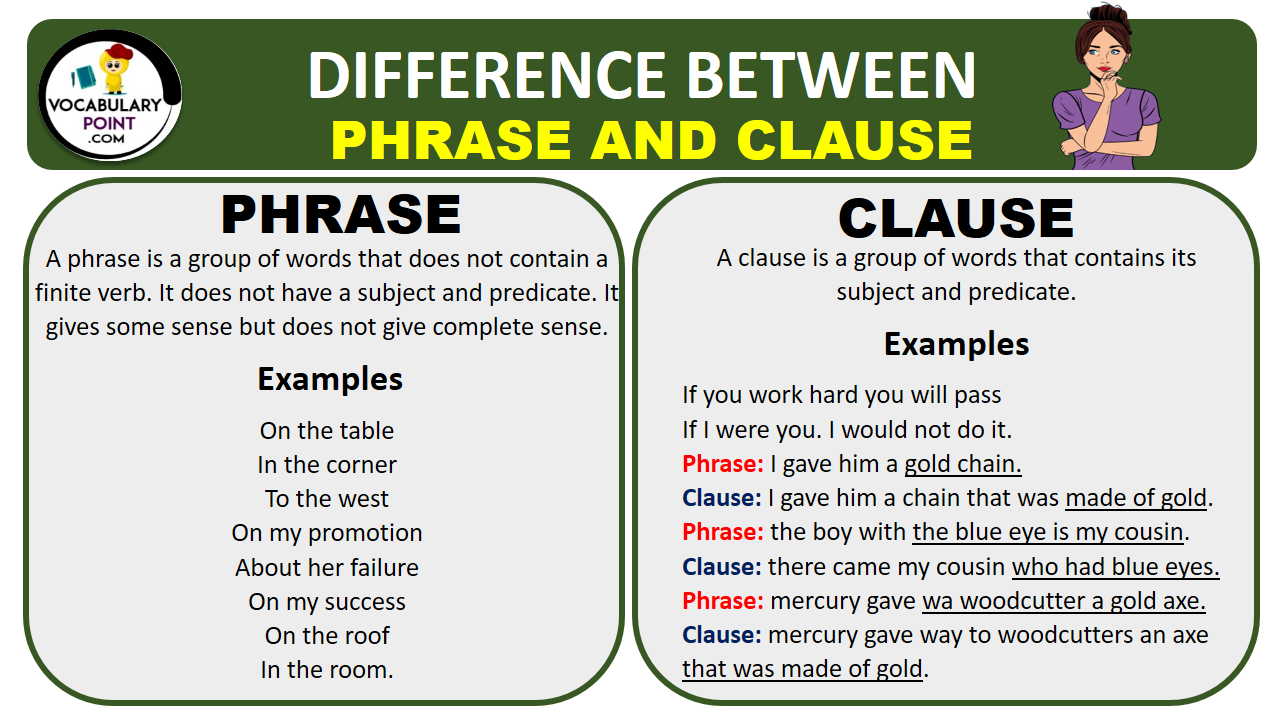DIFFERENCE BETWEEN PHRASE AND CLAUSE WITH EXAMPLES. OH! You want to learn about Phrases and clauses with their types so you are in a right place. You must read complete blog with details and it is a very informative lesson for beginners to learn English. All the details about Phrase and it types with examples and what is clause with examples exercise and sentences pdf are listed below Adjective phrase, Noun phrase, and adverb phrases are also listed here with their types.
Must Read: Funny English vocabulary words
WHAT IS THE DIFFERENCE BETWEEN A PHRASE AND A CLAUSE WITH EXAMPLES?
Answer: Phrase
A phrase is a group of words that does not contain a finite verb.
- I was happy about her success.
- The ball is on the roof.
- Girls are in the room.
Clause
A clause is a group of words that contains its subject and predicate.
- Phrase: mercury gave way woodcutter a gold axe.
- Clause: mercury gave way to woodcutters an axe that was made of gold.
Also Read: Phrase and its types
Difference between Phrases and Clauses
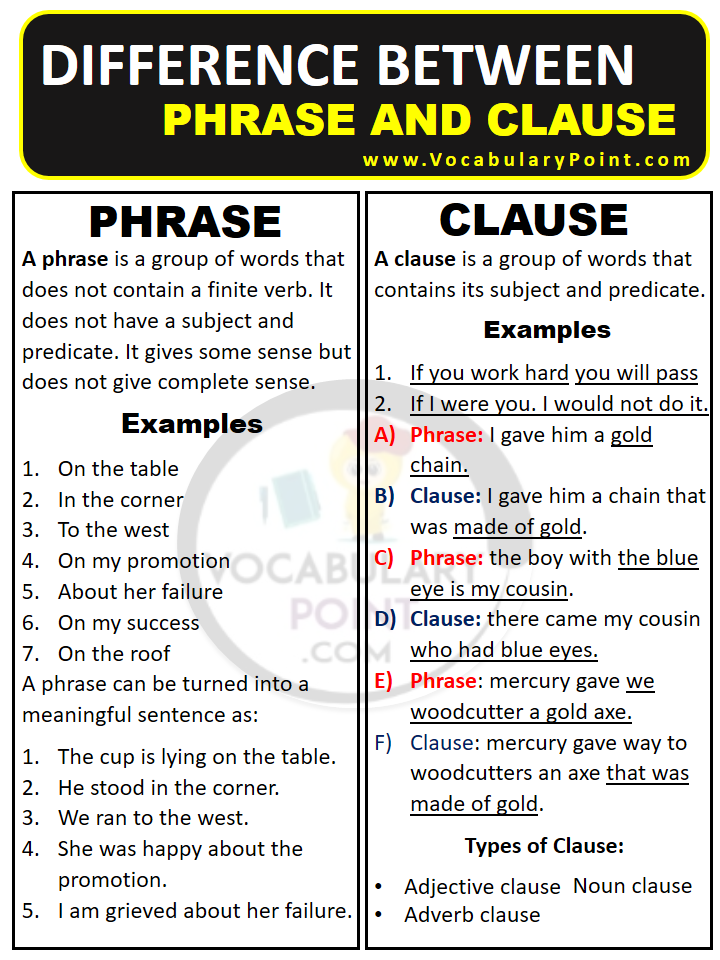
Phrase:
A phrase is a group of words that does not contain a finite verb. It does not have a subject and predicate. It gives some sense but does not give complete sense.
Some examples are listed below:
- On the table
- In the corner
- To the west
- On my promotion
- About her failure
- On my success
- On the roof
- In the room.
A phrase can be turned into a meaningful sentence as:
- The cup is lying on the table.
- He stood in the corner.
- We ran to the west.
- She was happy about the promotion.
- I am grieved about her failure.
Clause
A clause is a group of words that contains its subject and predicate.
- If you work hard you will pass
- If I were you. I would not do it.
- Phrase: I gave him a gold clause
- clause: I gave him a chain that was made of gold.
- Phrase: the boy with the blue eye is my cousin.
- Clause: there came my cousin who had blue eyes.
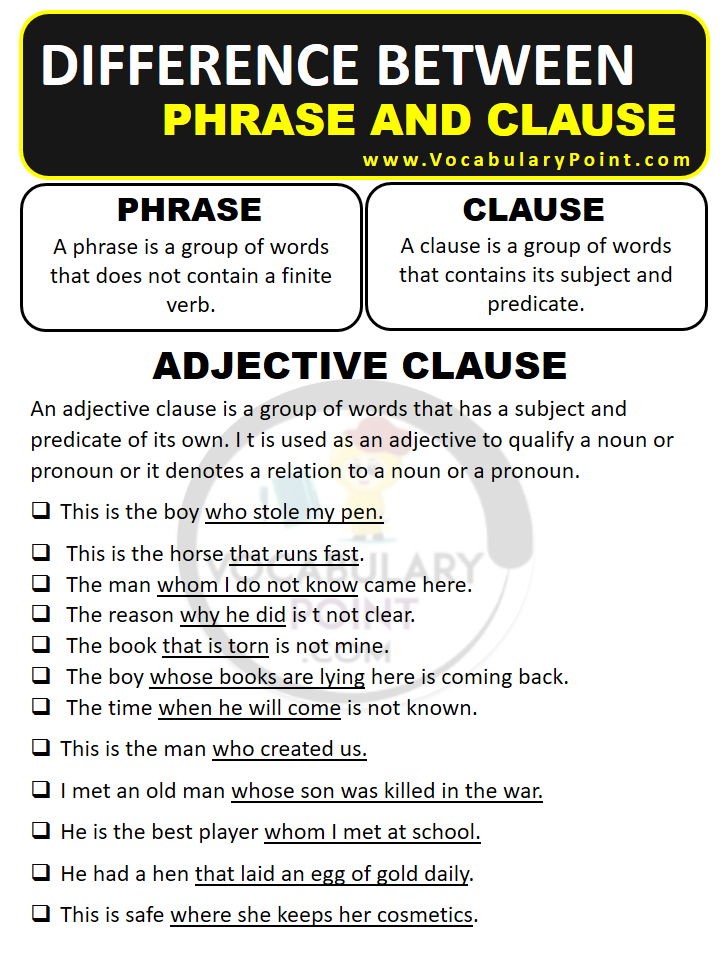
Let us discuss the clause in detail
- ADJECTIVE CLAUSE
An adjective clause is a group of words that has a subject and predicate of its own. I t is used as an adjective to qualify a noun or pronoun or it denotes a relation to a noun or a pronoun. OR
When a word qualifies as a noun or a pronoun, it is called an adjective. When a clause qualifies as noun or pronoun, it is called an adjective clause.
- This is the boy who stole my pen.
- This is the horse that runs fast.
- The man whom I do not know came here.
- The reason why he did iis t not clear.
- The book that is torn is not mine.
- The boy whose books are lying here is coming back.
- The time when he will come is not known.
Detailed lesson:
In the first sentence ‘’who stole my pen’’ is an adjective clause it is because before who is a boy then discusses the pen and then the noun pronoun and a group of words become an adjective clause.
In the first sentence before the adjective clause is listed who, and in the second sentence is which, and third whom, and the fourth sentence is why, the fifth that, the sixth whose, these are the words that contain these words they are called adjective clauses. These words are not adjective clauses they just are called descriptive words.
This is the man who created us.
I met an old man whose son was killed in the war.
He is the best player whom I met at school.
He had a hen that laid an egg of gold daily.
This is safe where she keeps her cosmetics.
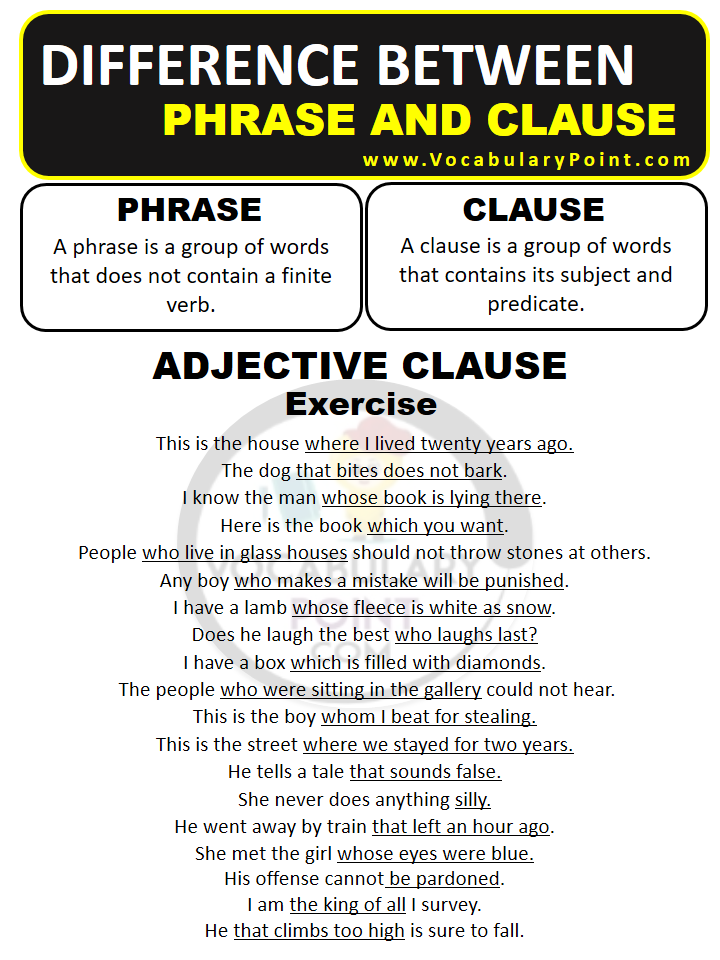
PHRASES AND CLAUSES EXERCISES
- This is the house where I lived twenty years ago.
- The dog that bites does not bark.
- I know the man whose book is lying there.
- Here is the book which you want.
- People who live in glass houses should not throw stones at others.
- Any boy who makes a mistake will be punished.
- I have a lamb whose fleece is white as snow.
- Does he laugh the best who laughs last?
- I have a box which is filled with diamonds.
- The people who were sitting in the gallery could not hear.
- This is the boy whom I beat for stealing.
- This is the street where we stayed for two years.
- He tells a tale that sounds false.
- She never does anything
- He went away by train that left an hour ago.
- The boy who worked hard gained the prize.
- She met the girl whose eyes were blue.
- His offense cannot be pardoned.
- I am the king of all I survey.
- He that climbs too high is sure to fall.
- This is the road that leads to china.
- The time when he will come is not known.
- The hall holds only one thousand
- The students who work hard are liked by the teacher.
- Iqbal who is a great poet is called our national poet.
- Coal which is a useful mineral is found in Baluchistan.
- The Reason Why he did it is not clear.
- This is the house where I lived two years ago.
- Ahmad told me that he stood first in the class.
- The grapes which ali bought yesterday are sour.
- The house which is under construction belongs to my father.
- Naima met the girl whose eyes were blue.
- I went to the doctor who had met an accident.
Must Read: Daily used English sentences
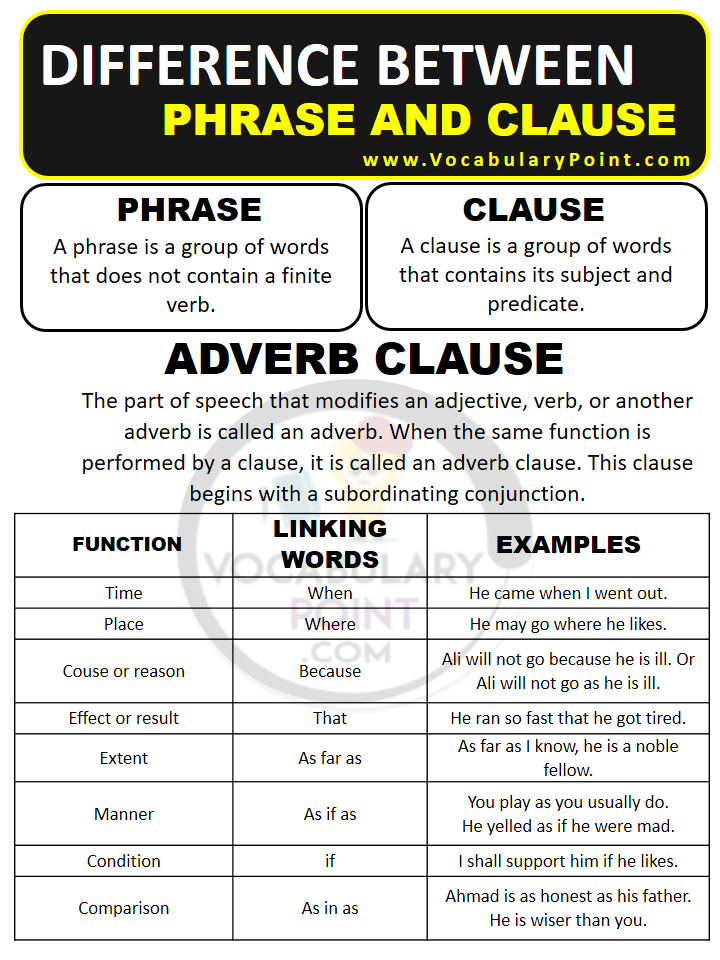
ADVERB CLAUSE
The part of speech that modifies an adjective, verb, or another adverb is called an adverb. When the same function is performed by a clause, it is called an adverb clause. This clause begins with a subordinating conjunction.
For examples:
- It usually denotes
- Time
- Place
- Cause or reaction
- Effect or result
- Extent
- Manner
- Comparison
- Contrast
- Condition
- Purpose
| THE FUNCTION OF AN ADVERB CLAUSE | LINKING WORDS | EXAMPLES |
| Time | When | He came when I went out. |
| Place | Where | He may go where he likes. |
| Couse or reason | Because | Ali will not go because he is ill. Or
Ali will not go as he is ill. |
| Effect or result | That | He ran so fast that he got tired. |
| Extent | As far as | As far as I know, he is a noble fellow. |
| Manner | As if as | You play as you usually do.
He yelled as if he were mad. |
| Condition | if | I shall support him if he likes. |
| Comparison | As in as | Ahmad is as honest as his father.
He is wiser than you. |
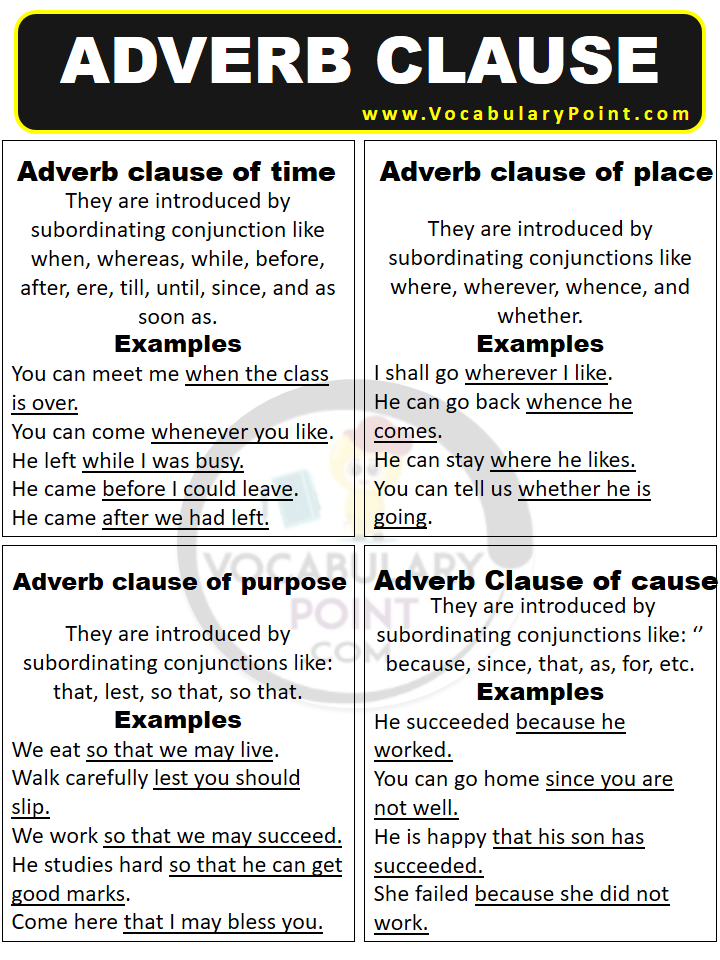
Linkers of adverb clause
- Adverb clause of time
They are introduced by subordinating conjunction like when, whereas, while, before, after, ere, till, until, since, and as soon as.
- You can meet me when the class is over.
- You can come whenever you like.
- He left while I was busy.
- He came before I could leave.
- He came after we had left.
- Do good before you die?
- I waited for her till she returned.
- Do not leave this place until I come.
- I had not heard from him since he left.
- He left as soon as I reached.
- Adverb clause of place
They are introduced by subordinating conjunctions like where, wherever, whence, and whether.
Examples:
- I shall go wherever I like.
- He can go back whence he comes.
- He can stay where he likes.
- You can tell us whether he is going.
Adverb clause of purpose
They are introduced by subordinating conjunctions like: that, lest, so that, so that.
Examples:
- We eat so that we may live.
- Walk carefully lest you should slip.
- We work so that we may succeed.
- He studies hard so that he can get good marks.
- Come here that I may bless you.
Adverb Clause of cause or reason
They are introduced by subordinating conjunctions like: ‘’ because, since, that, as, for, etc.
- He succeeded because he worked.
- You can go home since you are not well.
- He is happy that his son has succeeded.
- She failed because she did not work.
- I spoke to his brother as he was not present.
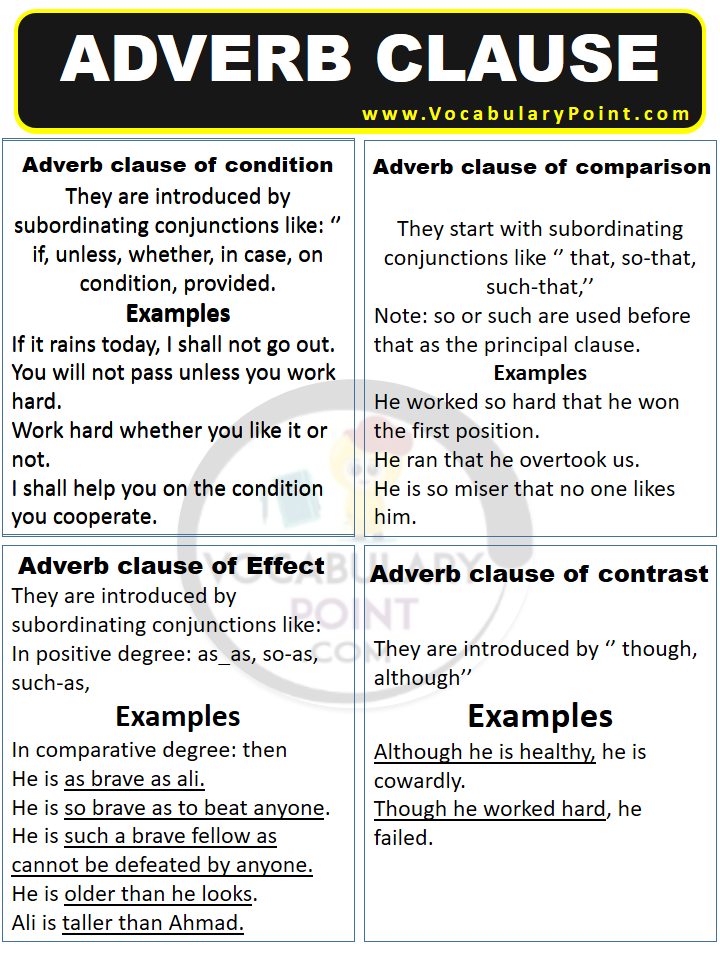
Adverb clause of condition
They are introduced by subordinating conjunctions like: ‘’ if, unless, whether, in case, on condition, provided, supporting that.
Examples:
- If it rains today, I shall not go out.
- You will not pass unless you work hard.
- I shall go in case he comes.
- Work hard whether you like it or not.
- I shall help you on the condition you cooperate.
- I shall help you provided you work hard.
- Supposing that he comes, I shall support him.
Note: sometimes, subordinating conjunction is omitted in the past conditional as:
- Had he come, he would have met me.
- Had you worked hard, you would not have regretted it.
- If I were the president, I would have improved the financial condition of the country.
Adverb clause of Effect or consequence
They start with subordinating conjunctions like ‘’ that, so-that, such-that,’’
Note: so or such are used before that as the principal clause.
Examples:
- He worked so hard that he won the first position.
- They were so tired that they stopped.
- He ran that he overtook us.
- He is so miser that no one likes him.
Adverb clause of comparison
They are introduced by subordinating conjunctions like:
- In positive degree: as_as, so-as, such-as,
- In comparative degree: then
- He is as brave as ali.
- He is so brave as to beat anyone.
- He is such a brave fellow as cannot be defeated by anyone.
- He is older than he looks.
- Ali is taller than Ahmad.
Adverb clause of contrast
They are introduced by ‘’ though, although’’
- Although he is healthy, he is cowardly.
- Though he worked hard, he failed.
Adverb clause of the extent
They are introduced by subordinating conjunctions like ‘’ as far as, so far as, so-as.
- As far as his case is concerned, I can say nothing.
- So far as I know, he is a noble fellow.
- He worked to succeed.
Adverb clause of manner
They are introduced by as, as if.
Examples:
- I hit the ball as I liked.
- He cannot do everything as he likes.
- He cries as if he were mad.
- He acted as if he had been trained.
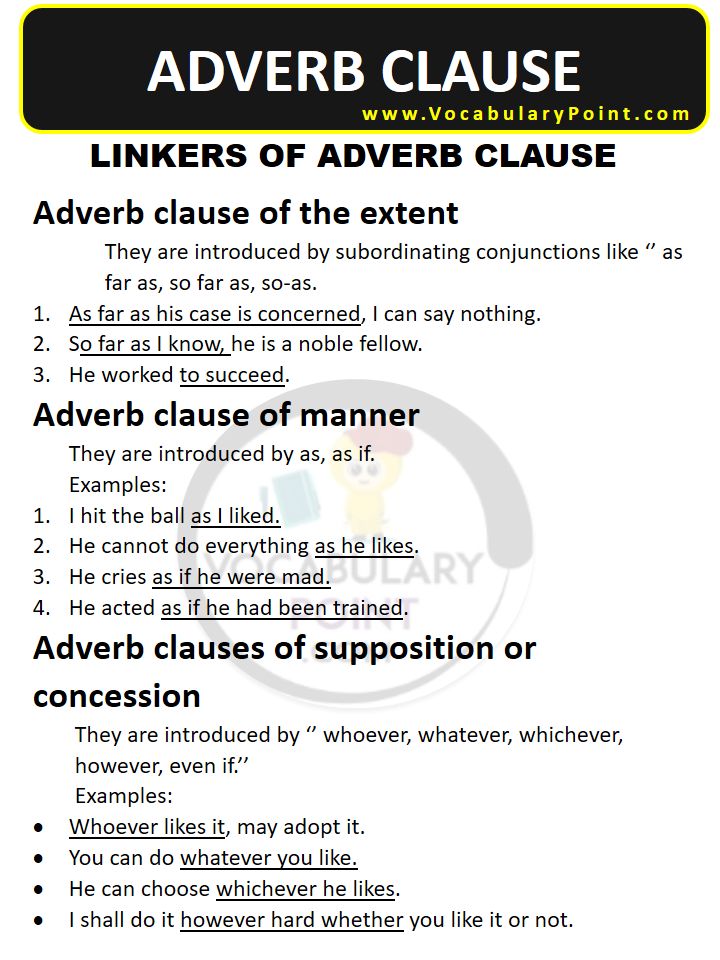
Adverb clauses of supposition or concession
They are introduced by ‘’ whoever, whatever, whichever, however, even if.’’
Examples:
- Whoever likes it, may adopt it.
- You can do whatever you like.
- He can choose whichever he likes.
- I shall do it however hard whether you like it or not.
- Even if he speaks the truth, nobody believes in him.
- If he runs all the time, he will get exhausted soon.
- Strike while the iron is hot.
- I worked so hard that I spoiled my health.
- If you work hard, you will pass.
- As far as I know, he is honest.
- They stayed where they liked.
- It is so many years since I saw you.
- We worked hard so that we may pass.
- He started early so that he might catch the train.
- He could not pass because he did not work hard.
- She is not as tall as her mother.
- The more, the merrier.
- He is so good as to help me.
- He is not as intelligent as his sister.
- If he does not come here, I shall not oblige him.
- Walk with care lest you should slip.
- You must work hard ere you grow old.
- You may continue your work even though you are tired.
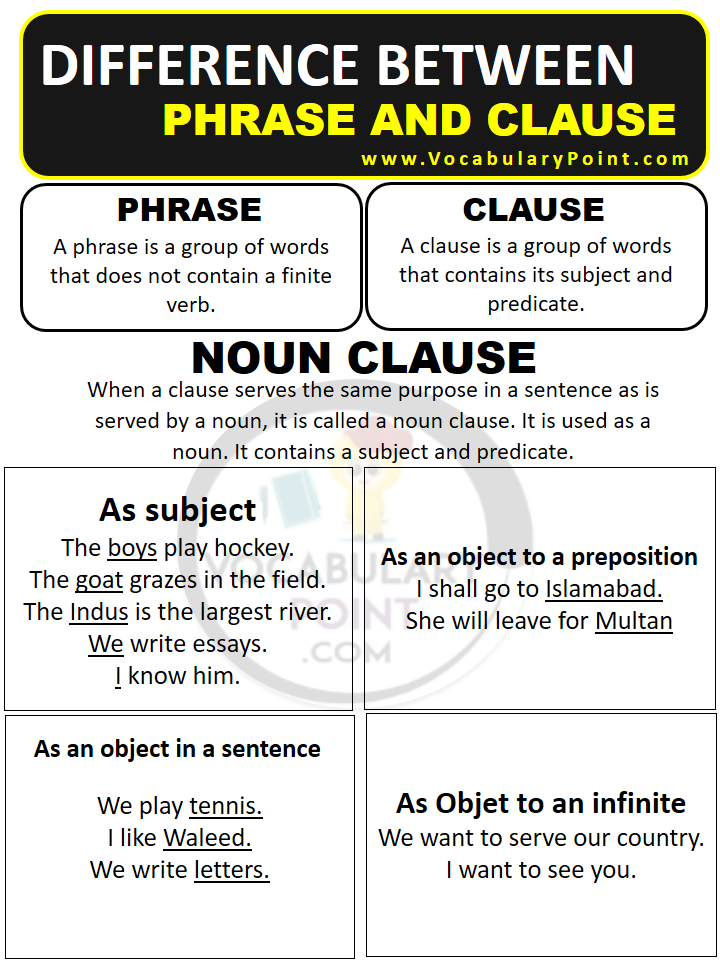
DIFFERENCE BETWEEN PHRASE AND CLAUSE And ITS TYPES
Noun Clause
When a clause serves the same purpose in a sentence as is served by a noun, it is called a noun clause. It is used as a noun. It contains a subject and predicate.
Before studying the use of noun clauses, let us learn the use of nouns.
Use of noun
A noun does the following tasks in s sentence.
- As subject
- The boys play hockey.
- The goat grazes in the field.
- The Indus is the largest river.
- We write essays.
- I know him.
- Health is wealth.
- As an object in a sentence
- We play
- I like
- We write
- As an object to a preposition
- I shall go to
- She will leave for
- As Object to an infinite
- We want to serve our country.
- I want to see you.
- As an object to participle
The thief began to steal considering the inmates sleeping.
Note: The participle is framed by adding ‘’ing’’ to the first form of a verb as eat: eating, work: working, Play: playing.
- As a complement to a verb
- We made Ahmad our captain.
- Opposition to a noun or a pronoun
- Quaid-e-Azim, the founder of Pakistan, was born in Karachi.
- Islamabad is the capital of Pakistan and is a beautiful city.
- Karachi, mini Pakistan, is the capital of Sindh.
Note: when a word or writing in a sentence has the same meaning as another word or writing, they are called Apposition to each other.
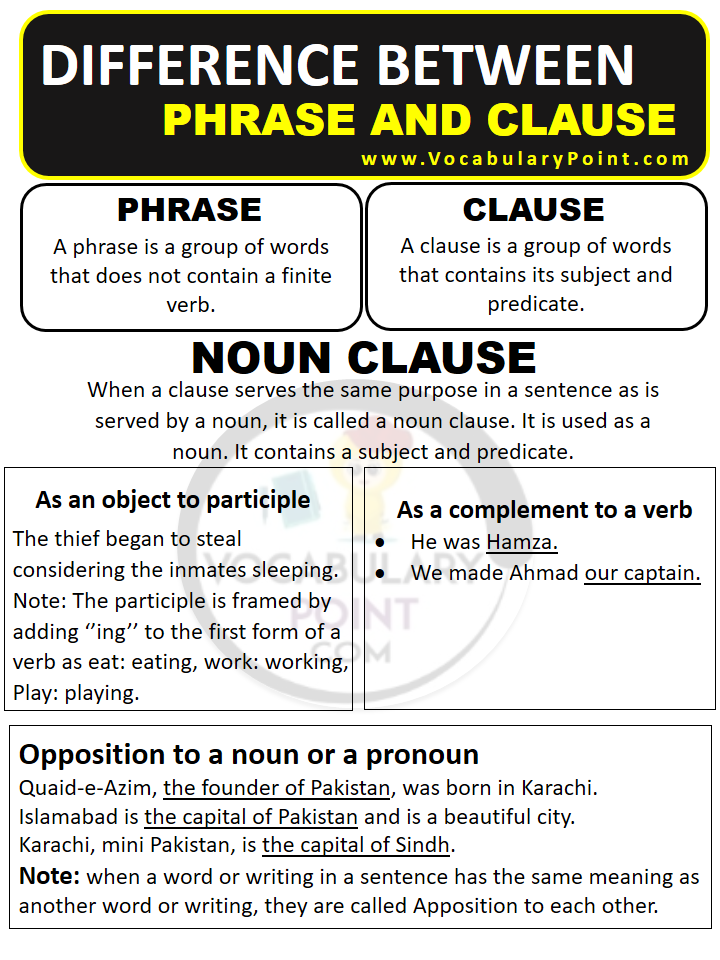
FUNCTION OF A NOUN CLAUSE
| Functions of a noun clause | Examples |
| As subject | All that he reported is false.
Whether he will come is certain. When he will leave is uncertain. That he is a cheat is known to all. How he passed is clear to us. |
| Object | We know that he is a cheat.
We are sure that he will reach soon. We believe what he says. |
| Object to a preposition | I know nothing of what he did.
It depends on what he concludes. |
| complement | This is all that we struggled with.
That is all that they concluded. |
| Opposition to ‘’it or noun’’ | My hope that he will pass proved false.
It is a fact that he is honest. She is indeed a swindler. |
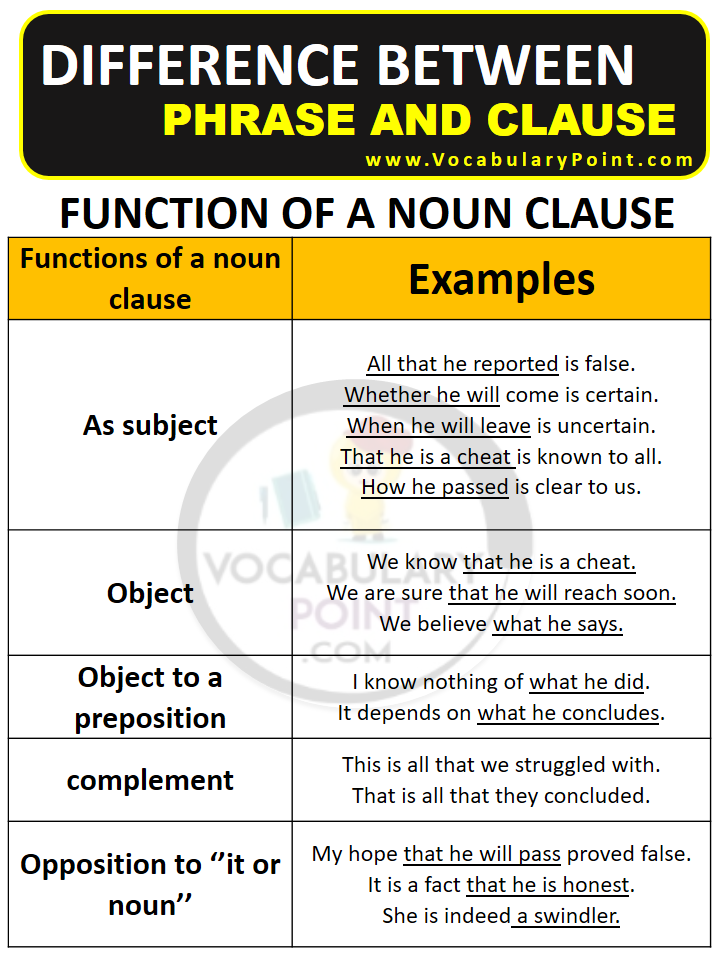
Linking Words used in a noun clause
That: He said that he would pass.
Who: he knows who I am.
Whose: I know whose papers these are.
What: everyone knows what caused his death.
Which: I can tell which one is your cow.
Where: I do not know where he lives.
When: do you know When all will come?
Why: do you know why he came here?
How: I shall explain how the chain was broken.
Why: do you know why he came here?
Whatever: we spend whatever we like.
If\whether: he asked me whether\if I would do him a favor.
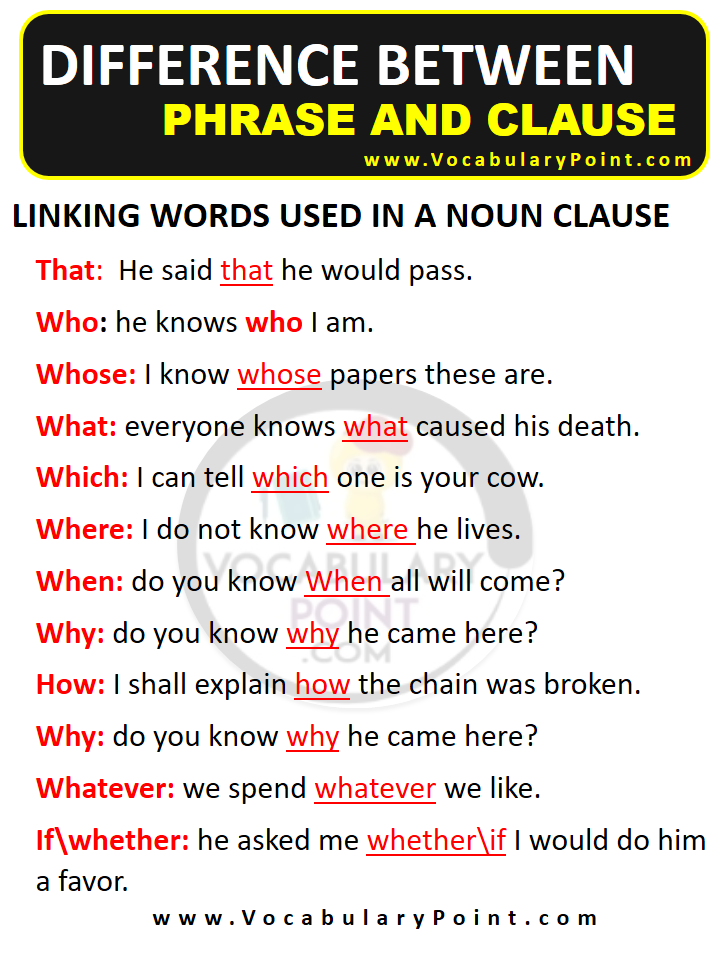
Use of Noun Clause
Subject to a verb:
- That he will come is not certain.
- That he will return is quite certain.
- What he says is false.
- Who came here, no one knows with certainty.
- When he will marry is uncertain.
- Why he left the school is a mystery.
- When he will marry is uncertain.
- Which he selects is not known to anyone.
- How the thief stole is not known.
- Whether she will come seems uncertain.
Object to a verb
- I think that the post office is quite near.
- We are certain that he always speaks the truth.
- She denied that she had taken tea.
- I can explain what befall him.
- I do not know how he was ruined.
- Can you tell why Ali did this?
- I cannot say when he will come.
- Do you know where he lives?
- No one knows who the speaker was.
- I know that she wants.
Object to a preposition:
- We should listen to what he says.
- There is some sense in what he pronounces.
- I know nothing about what he intends to do.
- She is afraid of whatever she sees.
- Pay attention to what your teacher says.
- He is suffering from what the doctor knows.
- We live on what we eat.
- There was no complaint except that the night was cold.
- This house will be sold for what it is worth.
- There is no meaning in what you say.
Object to a participle
- We went out thinking that the night was starry.
- He came to me hoping that he would cheat me.
- The fox went away saying that grapes are sour.
- The bear went away taking the man to be dead.
- The deceit fired thinking that we were unarmed.
- The doctor went away saying that he would come back.
- They cried for help seeing that they were in danger.
- We rushed to help him see that he was in trouble.
- I went to Lahore hoping that I would meet the secretary.
- We work hard hoping that we would pass.
Object to an infinitive
- We went to know what has happened.
- We are sorry to say that we could not reach in time.
- It is essential to inquire how he was killed.
- We went to ask how the sum was solved.
- The cow wanted to see what was in a jug.
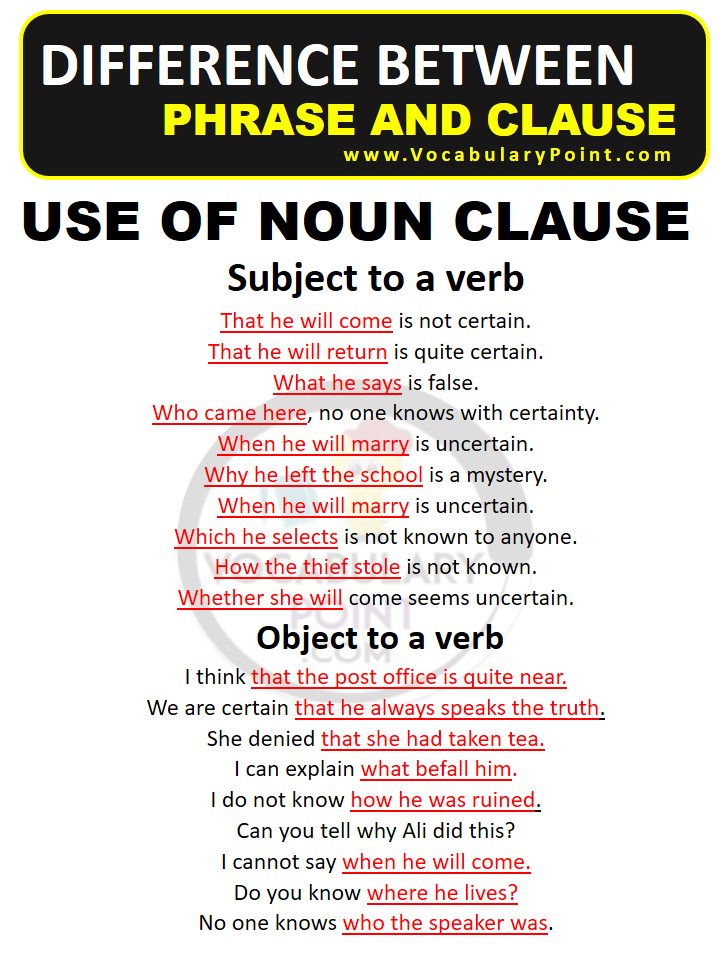
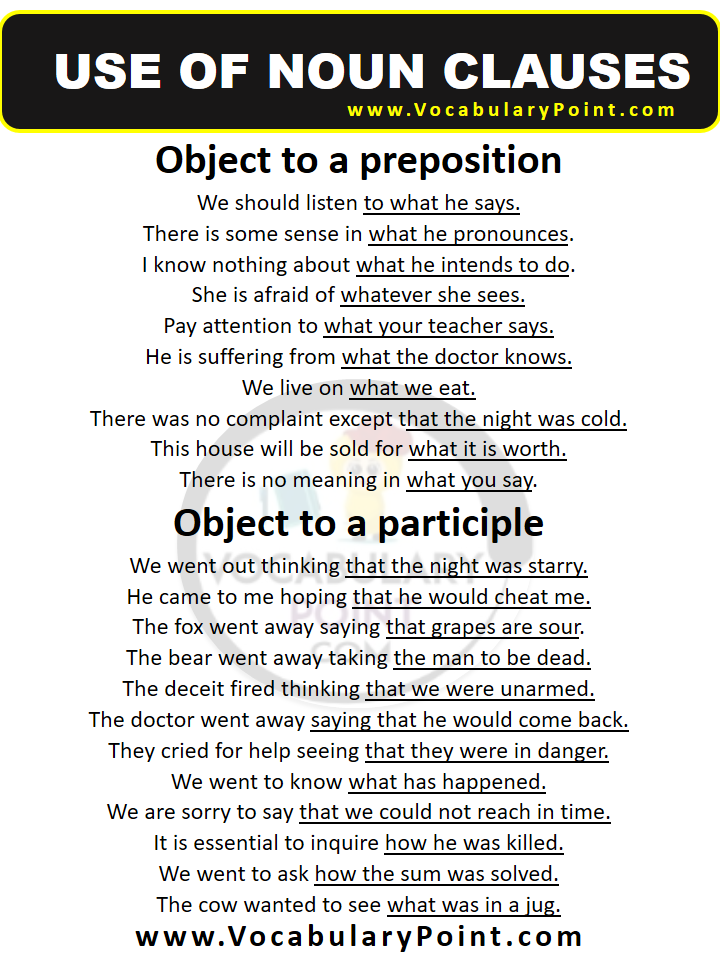
You can Download DIFFERENCE BETWEEN PHRASE AND CLAUSE WITH EXAMPLES PDF
